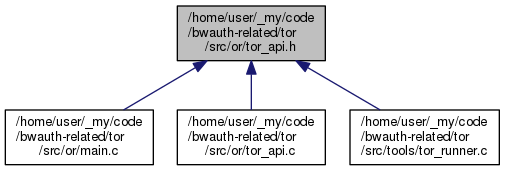Public C API for the Tor network service. More...

Go to the source code of this file.
Typedefs | |
| typedef struct tor_main_configuration_t | tor_main_configuration_t |
Functions | |
| tor_main_configuration_t * | tor_main_configuration_new (void) |
| int | tor_main_configuration_set_command_line (tor_main_configuration_t *cfg, int argc, char *argv[]) |
| void | tor_main_configuration_free (tor_main_configuration_t *cfg) |
| int | tor_run_main (const tor_main_configuration_t *) |
| int | tor_main (int argc, char **argv) |
Detailed Description
Public C API for the Tor network service.
This interface is intended for use by programs that need to link Tor as a library, and launch it in a separate thread. If you have the ability to run Tor as a separate executable, you should probably do that instead of embedding it as a library.
To use this API, first construct a tor_main_configuration_t object using tor_main_configuration_new(). Then, you use one or more other function calls (such as tor_main_configuration_set_command_line() to configure how Tor should be run. Finally, you pass the configuration object to tor_run_main().
At this point, tor_run_main() will block its thread to run a Tor daemon; when the Tor daemon exits, it will return. See notes on bugs and limitations below.
There is no other public C API to Tor: calling any C Tor function not documented in this file is not guaranteed to be stable.
Function Documentation
◆ tor_main()
| int tor_main | ( | int | argc, |
| char ** | argv | ||
| ) |
Run the tor process, as if from the command line.
- Deprecated:
- Using this function from outside Tor is deprecated; you should use tor_run_main() instead.
BUGS: This function has all the same bugs as tor_run_main().
LIMITATIONS: This function has all the limitations of tor_run_main().

◆ tor_main_configuration_free()
| void tor_main_configuration_free | ( | tor_main_configuration_t * | cfg | ) |
Release all storage held in cfg.
Once you have passed a tor_main_configuration_t to tor_run_main(), you must not free it until tor_run_main() has finished.
◆ tor_main_configuration_new()
| tor_main_configuration_t* tor_main_configuration_new | ( | void | ) |
Create and return a new tor_main_configuration().
◆ tor_main_configuration_set_command_line()
| int tor_main_configuration_set_command_line | ( | tor_main_configuration_t * | cfg, |
| int | argc, | ||
| char * | argv[] | ||
| ) |
Set the command-line arguments in cfg.
The argc and argv values here are as for main(). The contents of the argv pointer must remain unchanged until tor_run_main() has finished and you call tor_main_configuration_free().
Return 0 on success, -1 on failure.
◆ tor_run_main()
| int tor_run_main | ( | const tor_main_configuration_t * | ) |
Run the tor process, as if from the command line.
The command line arguments from tor_main_configuration_set_command_line() are taken as if they had been passed to main().
This function will not return until Tor is done running. It returns zero on success, and nonzero on failure.
If you want to control when Tor exits, make sure to configure a control socket. The OwningControllerFD option may be helpful there.
BUG 23847: Sometimes, if you call tor_main a second time (after it has returned), Tor may crash or behave strangely. We have fixed all issues of this type that we could find, but more may remain.
LIMITATION: You cannot run more than one instance of Tor in the same process at the same time. Concurrent calls will cause undefined behavior. We do not currently have plans to change this.
LIMITATION: While we will try to fix any problems found here, you should be aware that Tor was originally written to run as its own process, and that the functionality of this file was added later. If you find any bugs or strange behavior, please report them, and we'll try to straighten them out.

 1.8.13
1.8.13